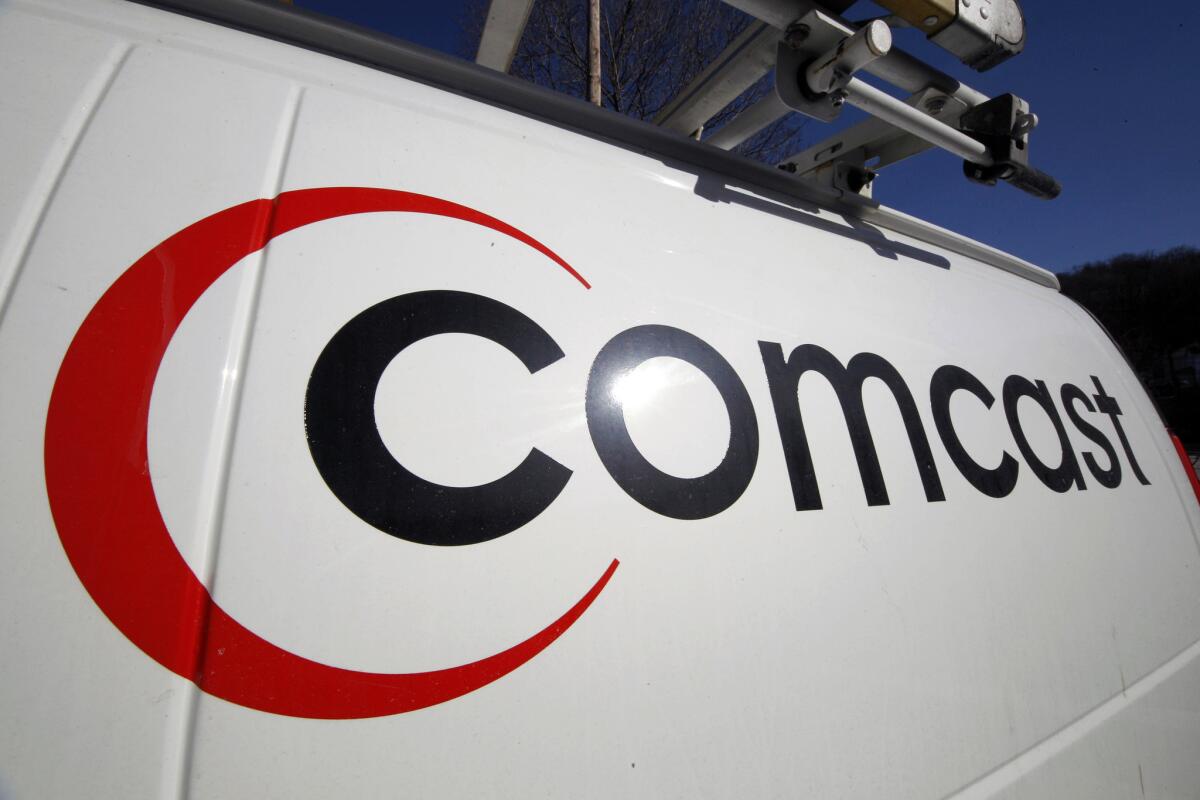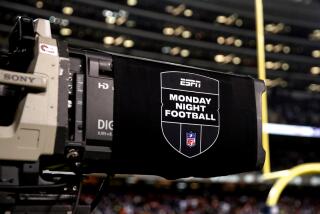Comcast to swap customers with Charter in an effort to ease TWC deal

Cable companies Comcast Corp. and Charter Communications have agreed to a complex $19.5-billion deal to divvy up subscribers — including parts of Los Angeles, Riverside and Ventura counties.
Comcast is already attempting to take over Time Warner Cable systems, which provide cable TV and high-speed Internet service to 1.5 million customers in the Los Angeles region. Combined, the two cable giants would serve more than a third of the nation’s cable TV and residential high-speed Internet market.
But under the proposal unveiled Monday, Comcast would gain even more turf and customers in Southern California.
Nearly 280,000 homes in Southern California that currently receive cable service from Charter would be switched to Comcast as early as next year. The Charter customers live in areas including Long Beach, Burbank, Glendale, Whittier, San Bernardino, Riverside and San Luis Obispo.
PHOTOS: Box office top 10 of 2013 | Biggest flops of 2013
The deal stems from Comcast’s commitment to shed at least 3 million subscribers from its eventual national footprint, in an effort to win the federal government’s approval of its acquisition of Time Warner Cable. Comcast currently provides service to 22 million customers nationwide, and adding the Time Warner Cable customers would expand Comcast’s business to more than 33 million homes.
Monday’s transaction allows Comcast to cherry-pick the markets it wants to retain and, in the case of Southern California, actually increase its heft. At the same time, Comcast’s customer base is expected to come in at just under 30 million homes.
Comcast can only execute the Charter swap if it obtains federal approval for its $45-billion acquisition of Time Warner Cable, which the company announced in February.
Once all the deals are completed, Comcast would become the region’s dominant provider of cable TV and high-speed Internet service in Southern California with nearly 2 million customers.
Consumer watchdogs said Monday’s deal underscores their unease with Comcast’s growth plans.
“Cable barons have always been great at dividing up the country and refusing to compete with each other,” Matt Wood, policy director for the advocacy group Free Press, said in a statement. “Transforming three giant companies into two behemoths gives no comfort to content providers or consumers. Lawmakers and antitrust authorities shouldn’t be fooled either.”
Comcast Chief Executive Brian Roberts said the agreement “follows through on our willingness to divest subscribers, while also marking an important step in our merger with Time Warner Cable.”
The proposed transactions with Charter and the “realignment of key cable markets,” Roberts said, “will enable Comcast to fill in our footprint and deliver operational efficiencies and technology improvements.”
Comcast estimated the value of the transaction to its shareholders at about $19.5 billion, which includes proceeds from asset sales, equity value in new entities as well as a $9-billion reduction in Comcast debt.
The Comcast-Charter transaction would unfold in three separate steps.
PHOTOS: 2013’s highest-paid media executives
The first phase of the deal would have Comcast selling to Charter about 1.4 million subscribers — in Ohio, Wisconsin, Kentucky, Indiana and parts of Alabama — that currently receive their service from Time Warner Cable. Charter would pay Comcast about $7.3 billion in cash for those subscribers.
Those additions would allow Charter, which currently has about 4.4 million customers, to become the nation’s second-largest cable provider, with nearly 5.7 million subscribers.
Charter has said that it needs to get bigger to better compete in a fast-evolving industry that requires huge capital investments to maintain systems and roll out new features and technologies.
The company initially tried to purchase Time Warner Cable last year but was rebuffed. This year, Charter attempted to recruit Comcast to help it buy Time Warner Cable but Comcast turned around and separately struck its own agreement.
“It’s now official that Charter will leave [its] Time Warner Cable courtship with a sizable consolation prize,” cable analyst Craig Moffett of the MoffettNathanson research firm wrote in a Monday report. “The two-step transaction will eventually double Charter’s size.”
The deal, approved over the weekend by the boards of Comcast and Charter, must be approved by the Federal Communications Commission and others. Charter shareholders also must sign off.
The second phase of Monday’s transaction would involve the Charter customers in Southern California.
Under this scenario, Charter and Comcast would swap 1.6 million customers to reconfigure their service areas. The two sides have spent the last few weeks negotiating and carving up a map of the country in ways that would create greater scale and operational efficiencies.
For example, in addition to subscribers in Southern and Northern California, Comcast would gain customers in Atlanta and the North Carolina markets of Charlotte and Raleigh. Charter would pick up subscribers in Detroit, the Minneapolis area and Indianapolis.
The final phase would involve Comcast creating a publicly traded cable company that it would spin off with about 2.5 million subscribers that are currently part of Time Warner Cable’s systems. Investors of Comcast and Charter would jointly own the new company, but Comcast shareholders (including those who came over from Time Warner Cable) would maintain a 67% stake.
Analysts saw the new company as a vehicle for Charter to eventually increase its size in a tax efficient manner. Neither side would be allowed to consolidate systems owned by the new company for four years. The new company would provide service to parts of Ohio, Michigan, Minnesota, Wisconsin, Tennessee, Indiana and Alabama.
Moffett, the financial analyst, said the new company would provide a path for Charter to eventually add other systems, increasing its national footprint to more than 10 million subscribers.
Critics quickly sounded alarms, saying the latest agreement shows that Comcast already is flexing its muscle.
“Masquerading as subscriber divestitures, the agreement with Charter brings together the three largest cable providers, who account for 38% of cable subscribers and 45% of Internet subscribers,” said the Writers Guild of America, West, which represents TV and film writers.
“The decision of these three powerful companies to divide markets and share ownership of subscribers through a new publicly traded corporation is unprecedented and adds to the mounting evidence against the Comcast-Time Warner Cable merger,” the writers’ union said.
Randy Falco, chief executive of Univision Communications, said Monday that the merger would give Comcast “staggering influence over Hispanic consumers.”
“You’ve already heard that the new Comcast will be the dominant cable and high-speed broadband provider in markets with 30% of all U.S. cable households,” Falco said in an earnings conference call. “What you may not know is that the new Comcast will serve markets with 91% of all Hispanic households and be the top TV distributor in 19 out of the top 20 Hispanic markets.”
Univision, the nation’s largest Spanish-language media company, competes with Telemundo, a unit of Comcast’s NBCUniversal.
Comcast responded to Univision’s criticism by saying it was proud of its record, which includes offering more than 60 Latino channels.
More to Read
From the Oscars to the Emmys.
Get the Envelope newsletter for exclusive awards season coverage, behind-the-scenes stories from the Envelope podcast and columnist Glenn Whipp’s must-read analysis.
You may occasionally receive promotional content from the Los Angeles Times.







